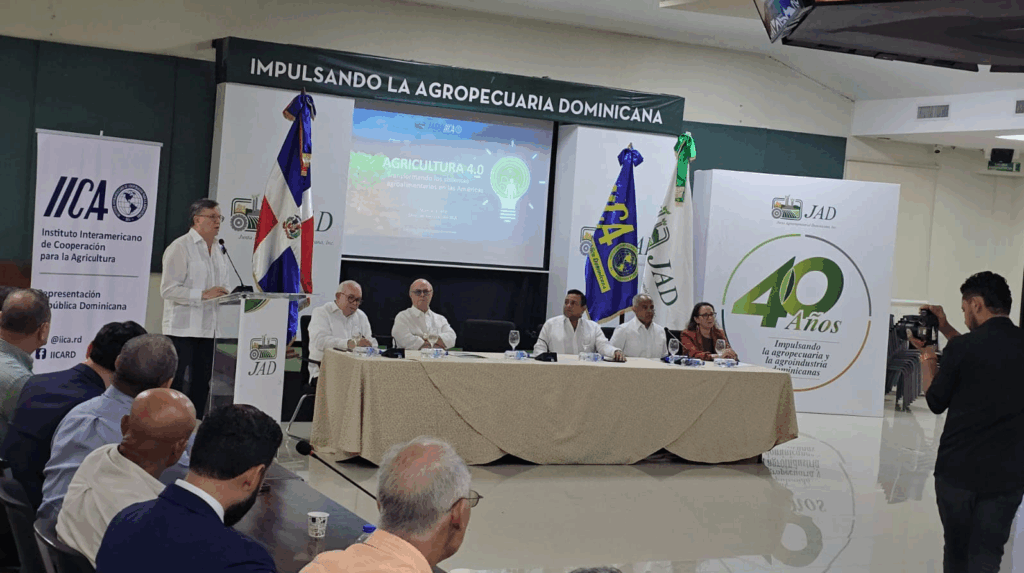
Santo Domingo, Dominican Republic, 9 July 2025 (IICA) – Speaking to an audience comprised of the Dominican Republic’s main agribusiness leaders, Manuel Otero stressed that Agriculture 4.0 is already underway in Latin America and the Caribbean, and represents a key tool to capitalize on the region’s strategic potential.
During an official visit to the Caribbean nation, and at the invitation of the Dominican Agribusiness Board (JAD), the Director General of the Inter-American Institute for Cooperation on Agriculture (IICA) delivered a keynote speech at JAD’s headquarters, during which he highlighted the role of innovation in production systems.
Otero’s work agenda in Santo Domingo will include a meeting with President Luis Abinader, who will confer the Order of Merit of Duarte, Sánchez and Mella, at the rank of Grand Cross Silver Plate, to the IICA Director General in recognition of his contributions to food security in the Caribbean country. The State ceremony will take place at the National Palace.
During his visit, Otero has held meetings with Dominican Minister of Agriculture Limber Cruz and his work team, as well as with the General Administrator of the Agricultural Bank, Fernando Durán, with whom he explored new opportunities for joint work between IICA and the Dominican Republic.
In JAD’s conference room, Otero was introduced by Osmar Benítez, Executive President of the institution, who noted that a government plan was underway in the Dominican Republic to double agricultural production by 2036. “We are working to ensure that the Dominican Republic can keep up with the changes that are taking place in global agriculture. To that end, we must talk about innovation, and that is why we have invited IICA and Dr. Manuel Otero here today”, said Benítez.
Participating in the event were former Dominican President (2000-2004) and former Minister of Agriculture Hipólito Mejía, who is also an IICA Goodwill Ambassador in Sustainable Agricultural Development Issues; Fernando Durán, General Administrator of the Agricultural Bank; Roberto Serrano Pimentel, Chair of JAD’s Advisory Council; and Gabriela Quiroga, IICA Representative in the Dominican Republic.

Fernando Durán, General Administrator of the Agricultural Bank; Hipólito Mejía, former Minister of Agriculture; IICA Director General Manuel Otero; Roberto Serrano Pimentel, Chair of JAD’s Advisory Council; Osmar Benítez, Executive President of JAD; and Gabriela Quiroga, IICA Representative in the Dominican Republic.
Key tools
During his presentation, entitled “Innovation as the Cornerstone of Agriculture 4.0”, Otero explained that new technologies are a key tool to transition towards smarter and more productive and sustainable systems.
“The good news”, he said, “is that innovation allows us to harness the region’s tremendous potential: biological wealth, the possibility of sequestering carbon, which in turn allows for mobilizing international funding, the capacity to transform biomass and the digital skills of youth”.
“The future is here. We must make changes to develop a new rurality in Latin America and the Caribbean, but no one on the outside should be telling us what to do”, said Otero, who shared details and examples of the incorporation of new technologies that are already a reality in countries throughout the region.
He cited several examples, including the use of drones to monitor and apply inputs in sugar cane farming in Colombia; the use of artificial intelligence to predict pests in Peru; Brazil’s Climate, Agriculture and Forestry Coalition, which fosters data-based decision-making in Brazil; the incorporation of agroclimatic sensors for farm management in Uruguay; the growth of biotechnology and bio-inputs in Argentina; and blockchain and traceability in coffee production in Honduras.

Fernando Durán, General Administrator of the Agricultural Bank; and Manuel Otero, Director General of IICA.
Otero also referred to Agriculture 4.0 private and public initiatives in the Dominican Republic, which have yielded concrete and scalable results, such as the Santo Domingo Cyber Park.
“Transforming the potential of Agriculture 4.0 into action requires us to undertake decisive efforts together”, warned Otero, who mentioned the need to increase investment in research, strengthen the technical and digital skills of rural dwellers, modernize extension services and develop a new generation of regulations and public policies.
The IICA Director General also highlighted the leading role of the private sector in Agriculture 4.0 and agricultural innovation. “Between 60 and 70% of agricultural innovation comes from the private sector, which provides technological solutions and serves as an ally in scaling up innovations from research centers to producers. It is undoubtedly a strategic stakeholder for national economies, offering opportunities for economic growth and inclusion. The private sector is key at IICA and takes part in decision-making”, he stated.
“We are facing a new frontier of knowledge”, he added, “the likes of which we have never seen before. And it is up to us to ensure that this valuable opportunity does not become a nightmare. We must use new technologies for the benefit of our farmers, and we must do so together”.
Otero’s speech was followed by a question-and-answer session and dialogue among participants. The Director General of IICA and JAD officials also signed a general agreement for collaboration between the two institutions.

The IICA Director General delivered a presentation entitled “Innovation as the Cornerstone of Agriculture 4.0”.
More information:
Institutional Communication Division.
comunicacion.institucional@iica.int











